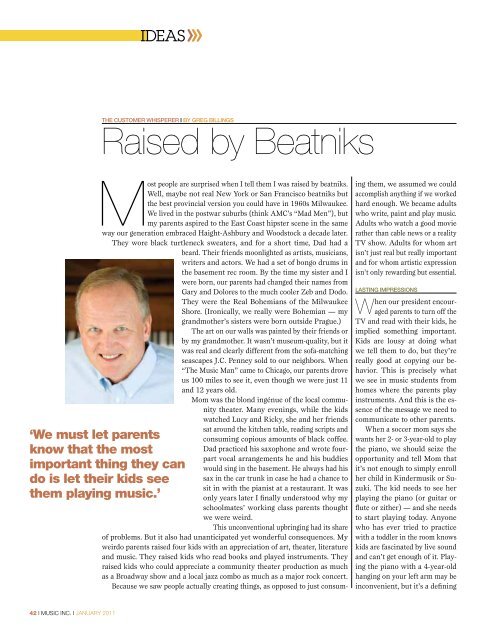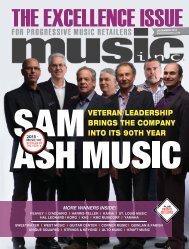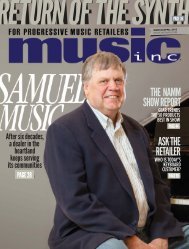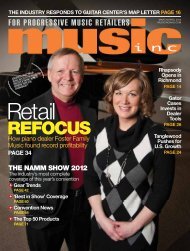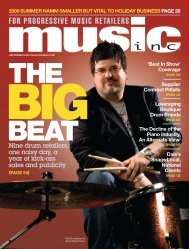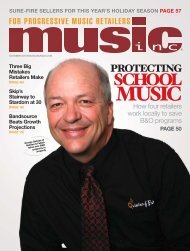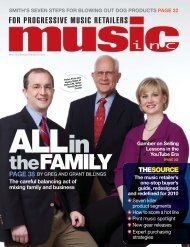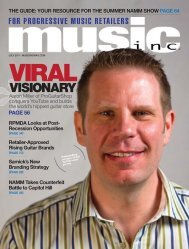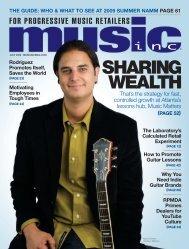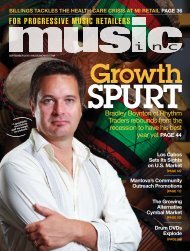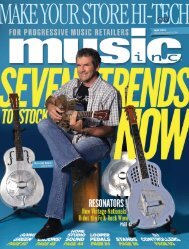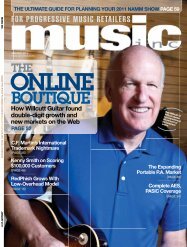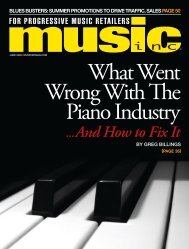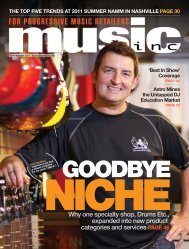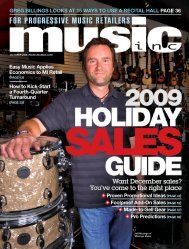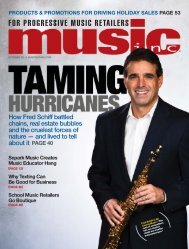Create successful ePaper yourself
Turn your PDF publications into a flip-book with our unique Google optimized e-Paper software.
42 I MUSIC INC. I JANUARY 2011<br />
THE cuSToMEr WHiSPErEr i By GrEG BillinGS<br />
Raised by Beatniks<br />
Most people are surprised when I tell them I was raised by beatniks.<br />
Well, maybe not real New York or San Francisco beatniks but<br />
the best provincial version you could have in 1960s Milwaukee.<br />
We lived in the postwar suburbs (think AMC’s “Mad Men”), but<br />
my parents aspired to the East Coast hipster scene in the same<br />
way our generation embraced Haight-Ashbury and Woodstock a decade later.<br />
They wore black turtleneck sweaters, and for a short time, Dad had a<br />
beard. Their friends moonlighted as artists, musicians,<br />
writers and actors. We had a set of bongo drums in<br />
the basement rec room. By the time my sister and I<br />
were born, our parents had changed their names from<br />
Gary and Dolores to the much cooler Zeb and Dodo.<br />
They were the Real Bohemians of the Milwaukee<br />
Shore. (Ironically, we really were Bohemian — my<br />
grandmother’s sisters were born outside Prague.)<br />
The art on our walls was painted by their friends or<br />
by my grandmother. It wasn’t museum-quality, but it<br />
was real and clearly different from the sofa-matching<br />
seascapes J.C. Penney sold to our neighbors. When<br />
“The <strong>Music</strong> Man” came to Chicago, our parents drove<br />
us 100 miles to see it, even though we were just 11<br />
and 12 years old.<br />
Mom was the blond ingénue of the local community<br />
theater. Many evenings, while the kids<br />
watched Lucy and Ricky, she and her friends<br />
sat around the kitchen table, reading scripts and<br />
consuming copious amounts of black coffee.<br />
Dad practiced his saxophone and wrote fourpart<br />
vocal arrangements he and his buddies<br />
would sing in the basement. He always had his<br />
sax in the car trunk in case he had a chance to<br />
sit in with the pianist at a restaurant. It was<br />
only years later I finally understood why my<br />
schoolmates’ working class parents thought<br />
we were weird.<br />
This unconventional upbringing had its share<br />
of problems. But it also had unanticipated yet wonderful consequences. My<br />
weirdo parents raised four kids with an appreciation of art, theater, literature<br />
and music. They raised kids who read books and played instruments. They<br />
raised kids who could appreciate a community theater production as much<br />
as a Broadway show and a local jazz combo as much as a major rock concert.<br />
Because we saw people actually creating things, as opposed to just consum-<br />
‘We must let parents<br />
know that the most<br />
important thing they can<br />
do is let their kids see<br />
them playing music.’<br />
ing them, we assumed we could<br />
accomplish anything if we worked<br />
hard enough. We became adults<br />
who write, paint and play music.<br />
Adults who watch a good movie<br />
rather than cable news or a reality<br />
TV show. Adults for whom art<br />
isn’t just real but really important<br />
and for whom artistic expression<br />
isn’t only rewarding but essential.<br />
laSTinG iMPrESSionS<br />
When our president encouraged<br />
parents to turn off the<br />
TV and read with their kids, he<br />
implied something important.<br />
Kids are lousy at doing what<br />
we tell them to do, but they’re<br />
really good at copying our behavior.<br />
This is precisely what<br />
we see in music students from<br />
homes where the parents play<br />
instruments. And this is the essence<br />
of the message we need to<br />
communicate to other parents.<br />
When a soccer mom says she<br />
wants her 2- or 3-year-old to play<br />
the piano, we should seize the<br />
opportunity and tell Mom that<br />
it’s not enough to simply enroll<br />
her child in Kindermusik or Suzuki.<br />
The kid needs to see her<br />
playing the piano (or guitar or<br />
flute or zither) — and she needs<br />
to start playing today. Anyone<br />
who has ever tried to practice<br />
with a toddler in the room knows<br />
kids are fascinated by live sound<br />
and can’t get enough of it. Playing<br />
the piano with a 4-year-old<br />
hanging on your left arm may be<br />
inconvenient, but it’s a defining


